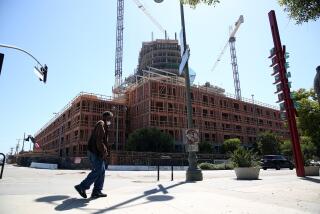Days Numbered for ‘Amateur’ Developers
- Share via
The real estate development industry will continue to undergo a metamorphosis centered on growing sophistication and increasing internationalization.
That’s the assessment of Alan Kreditor, executive director of USC’s Lusk Center for Real Estate Development, as he takes the pulse of the industry and tries to plan his school’s master of real estate development degree program accordingly.
Kreditor, who specializes in international planning, urban and regional design, and planning in private industry, said that in the last decade the development industry has already “reached a stage of such extraordinary sophistication.”
That’s a trend he sees continuing, and one that could force some of the smaller, less savvy developers out of the business.
“The days of the amateur developer, the guy who kind of stumbles into the field because he likes to do a little bit of building on the side, are numbered,” Kreditor said.
“I guess there will always be the exceptional case, but I think that they will be in the margin 20 years from now or they just won’t be out there.”
Here are three of the reasons he cites: “Finance has become so complicated, there are changing characteristics of building technology and building processes, and the regulatory environment has become just unbelievable, it’s such a big piece of the way in which one approaches development.
“The whole process by which one gets entitlements now is so elaborate, so complicated, so surrounded by political and administrative topography,” he noted.
That is one area that USC is tackling with its real estate program.
“We need to prepare people to deal in that kind of an environment,” Kreditor said, noting that new areas of focus include “environmental impact, Coastal Commission, endangered species, air quality--all of these issues, together with the old traditional things like zoning and subdivision recommendations.
“Look, 25 years ago, if you wanted to be a developer, you went out and looked for a site, you checked to see if the local general plan conformed to your ambitions for the site. If it didn’t, you tried to make a case for a zone change, and you had a fairly good chance of winning if you had a reasonable presentation.
“I’m not going to say it was easy, but it was relatively uncomplicated.”
He sees globalization of development as another major factor shaping the landscape of the field.
“Developers are going to deal not with just fellow developers down the road but with corporations and individuals around the world,” he said.
He hopes that in the future there will be a different perception of developers, “who more often than not, I think, incorrectly, but often enough correctly, have been labeled as sort of terrible plagues upon our society,” he notes.
“Part of that is a bad rap because the truth is that they produce things of social value, otherwise they couldn’t produce them. The market’s responding, and the market is in some way a measure of some social value out there. But it is true that often in development there are people who don’t do things very well.”
He thinks one of the responsibilities of educators should be to change that.
“Developers create our cities. It’s where so much of our social and physical landscape comes from and to allow it to proceed haphazardly or amateurishly, or without the full benefit of our best thinking, seems reckless to us,” Kreditor said.
“We invest very heavily, for example, in the design area. We think that design is one of the ways in which developers can show that they are good civic citizens, that they have responsibility in the community and so on.
“I think developers could potentially end up being our civic heroes, rather than the villains. We would hope that this is a field whose performance and reputation is substantially better 10 years from now. It deserves to be.”
More to Read
Inside the business of entertainment
The Wide Shot brings you news, analysis and insights on everything from streaming wars to production — and what it all means for the future.
You may occasionally receive promotional content from the Los Angeles Times.










